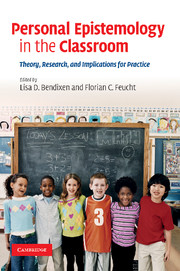Book contents
- Frontmatter
- Contents
- List of figures
- List of tables
- Contributors
- Part I Introduction
- Part II Frameworks and conceptual issues
- 2 Manifestations of an epistemological belief system in preschool to grade twelve classrooms
- 3 Epistemic climate in elementary classrooms
- 4 The integrative model of personal epistemology development: theoretical underpinnings and implications for education
- 5 An epistemic framework for scientific reasoning in informal contexts
- 6 Who knows what and who can we believe? Epistemological beliefs are beliefs about knowledge (mostly) to be attained from others
- Part III Students' personal epistemology, its development, and its relation to learning
- Part IV Teachers' personal epistemology and its impact on classroom teaching
- Part V Conclusion
- Index
4 - The integrative model of personal epistemology development: theoretical underpinnings and implications for education
Published online by Cambridge University Press: 04 May 2010
- Frontmatter
- Contents
- List of figures
- List of tables
- Contributors
- Part I Introduction
- Part II Frameworks and conceptual issues
- 2 Manifestations of an epistemological belief system in preschool to grade twelve classrooms
- 3 Epistemic climate in elementary classrooms
- 4 The integrative model of personal epistemology development: theoretical underpinnings and implications for education
- 5 An epistemic framework for scientific reasoning in informal contexts
- 6 Who knows what and who can we believe? Epistemological beliefs are beliefs about knowledge (mostly) to be attained from others
- Part III Students' personal epistemology, its development, and its relation to learning
- Part IV Teachers' personal epistemology and its impact on classroom teaching
- Part V Conclusion
- Index
Summary
Epistemological beliefs are an important aspect of current psychological thinking. Personal epistemological development and epistemological beliefs involve: how individuals come to know, the theories and beliefs they hold about knowing, and the manner in which such epistemological premises are a part of and an influence on the cognitive processes of thinking and reasoning (Hofer and Pintrich, 1997, p. 88).
In the classroom, students are exposed to new ideas, theories, and information from different sources every day. Students’ beliefs about knowledge and knowing influence the way they perceive and respond to the learning situations they encounter. For example, as students study an historical event such as the US civil war, they may have the opportunity to examine different sources of information such as a textbook that describes the war, personal letters written by soldiers, and/or analyses of the war published by history experts. The views of the students and other aspects of the epistemic climate (Bendixen and Rule, 2004) of their learning environment influence how these students will proceed. For instance, learners may be passive or active in this process, they may be asked to weigh evidence about these different historical sources and make their own warranted judgments, or they may be expected to find the one correct version of what happened and not question it. In addition, students may think that historical information is more relative and open to interpretation while a subject such as mathematics leaves very little room for student interpretation.
- Type
- Chapter
- Information
- Personal Epistemology in the ClassroomTheory, Research, and Implications for Practice, pp. 94 - 123Publisher: Cambridge University PressPrint publication year: 2010
- 12
- Cited by



